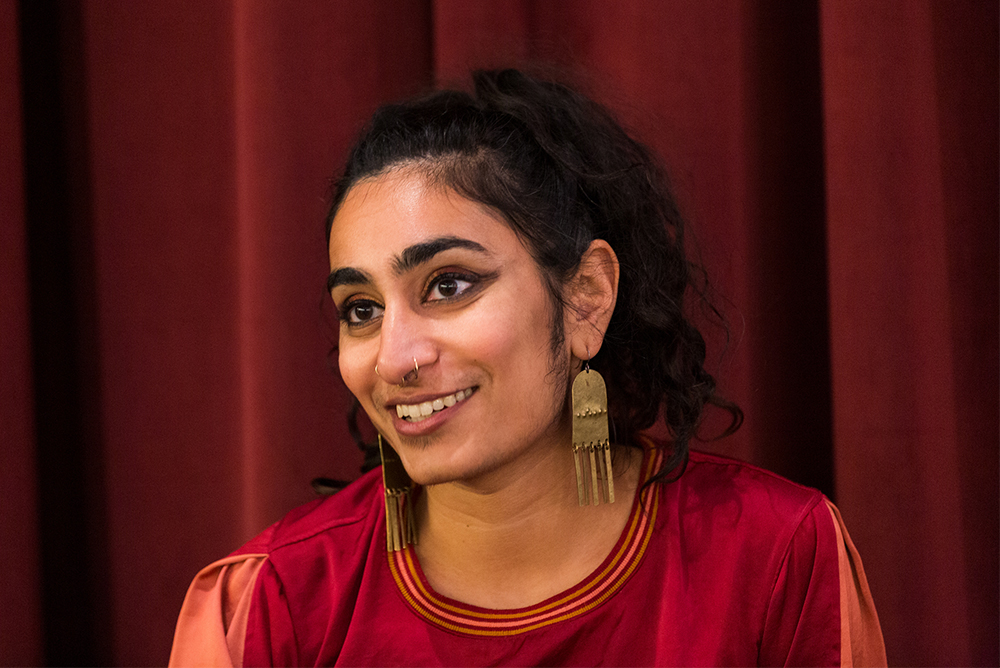
Photo by Ian Byers-Gamber.
Fatimah Asghar is a poet, novelist, filmmaker, educator, and performer. Their first novel, When We Were Sisters, was published in October. They are the writer and co-creator of Brown Girls, an Emmy-nominated web series that highlights friendships between women of color, and have written for the Disney+ show Ms. Marvel. Before participating in the Zócalo/ALOUD program “How Does L.A. Inspire First-Time Novelists?,” they sat down in our green room to talk Harry Potter fan fiction, unguarding their heart, and South Asian desserts.
What was the last book you checked out from the public library?
I really don’t remember. I will usually buy the book, because I know how our industry is. I love public libraries, but I haven’t checked out a book in a long time.
What is a stereotype about poets that you think is unfair?
I think we get a lot of “we’re very moody, we’re very isolated and very alone.” The idea of the poet sitting at a computer writing by themselves and being a hermit. For me, the way I came up through poetry was spoken word, so there was a lot of community and a lot of engagement. Poetry and writing were always a very community-centered thing.
How did you start writing?
I started writing Harry Potter fan fiction. That was my unfortunate entry into writing. But then I started taking it more seriously when I went to college and joined the spoken word poetry group.
What is one of the most haram [forbidden] things you’re willing to put on record?
I feel like all my writing is so haram. The other day my uncle called me and was talking about how it’s really warm right now and everyone is wearing short-shorts and bras. And I was like: I’m definitely that person, you just don’t know me that way!
You lived in Chicago. What is one of your favorite places to go there?
I love being by the lake. I just love water. There’s something specific about the Chicago lakeside that’s so beautiful.
What is one of your favorite Urdu words?
Kal [yesterday and tomorrow]. I love that interplay of yesterday and tomorrow. There’s so much promise. It’s such a poetic word to me.
What’s something that you’re proud of?
I’ve been a lot less guarded with my heart lately. It’s been a really long journey to get to the point where I’m like: I’m just going to be a little less guarded and allow for things to go in the way that they are and not try to control it, try not to be like “what if it ends in heartbreak?” I feel very proud for working on that.
What is your favorite ‘90s sitcom?
I don’t know that I watched a lot of sitcoms, but I did watch a lot of Nickelodeon. Shows like Taina. I just rewatched Brink!, the roller-skating movie. I didn’t watch Friends. I loved Girlfriends. A lot of my childhood taste in movies was weird, which is still the case.
Who is somebody who has inspired you?
I was just listening to an interview with my friend and incredible artist Krista Franklin, a Chicago-based poet and visual artist. She was speaking about collaboration in a way I found so deeply moving and so incredible.
Let’s play a game. Which desserts would you Bed, Wed, and Kill: ras malai, gulab jamun, and jalebi?
Bed: jalebi.
Wed: gulab jamun.
Kill: ras malai.
Where do you find community?
Something I think about a lot is that community is not something you find, it’s something you build. It’s an active process, and it’s reciprocal. Building community is a lot about thinking about the relationship you have to people, to place, and how much you are actively showing up. Also, specifically being someone who is queer, who is Muslim, and who is South Asian, I actively try to build community in queer spaces with people of color, with fellow Muslim people, with folks who identify as spiritual. And I’ve built community with a lot of artists because people can be vulnerable about who they are and the ethics they move with. I feel myself gravitated toward people who have a similar bent or similar values that I do.
What’s next after the novel? What are you working on?
I’m in a moment of what is next? That’s the question I feel like I am in. Just letting myself be open to receive and just to say this is moving me and this is where I want to go. I’m just waiting to see what lands and what I can move forward with.



